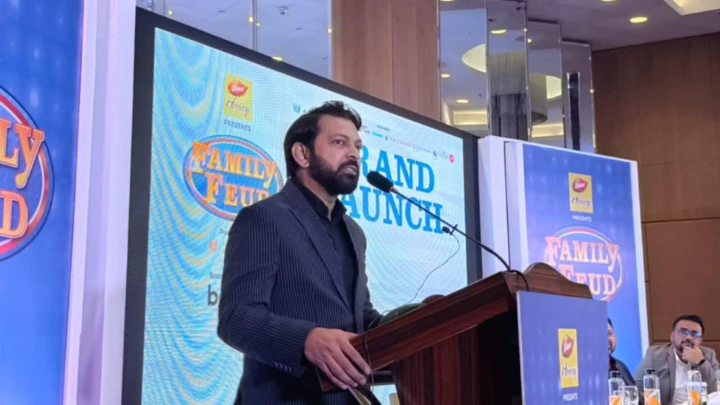'Guru' hits 60: There is only one James
DailyStar || Shining BD
To his devoted fans, he's either their "Guru" or their beloved "Nagar Baul." But, as far as James is concerned, he couldn't care less about these titles. His unbothered, carefree attitude is exactly what they love about him. The moment his fingers touch the guitar, he effortlessly proclaims to his fans, "You are my heart, you are my soul."
We're talking about the legendary rockstar of the subcontinent, James—formally known as Faruq Mahfuz Anam James. While he's widely known as "Nagar Baul" in Bangladesh, his fame extends far beyond, with an ever-growing international fanbase.
Originally being among the "Big Three" that popularised rock music in Bangladesh, he has long transcended his status as a musician to become a true cultural icon. The sheer response he derives out of any crowd, in any place and in any situation testifies his ever-lasting popularity among both avid music lovers and casual fans. Indeed, there can only be one 'Guru' and at the moment, it is none other than James.
Today this iconic musician celebrates his 60th birthday.
James was born in 1964 in Naogaon, but his formative years and musical journey began in Chattogram. His father was a government official, eventually serving as the chairman of the Chattogram Education Board.
Despite his family's resistance, James pursued his passion for music, even running away from home at one point to dedicate himself to the craft. He took refuge in Aziz Boarding in Chattogram, and that's where his career took off. In 1980, James founded the band Feelings, and his debut album "Station Road" was released in 1987. However, it was his solo album "Ononna" in 1988 that catapulted him to superstardom.

After that, he dropped simultaneous hit albums, one after another, starting with "Jail Theke Bolchi" in 1990, "Nagar Baul" in 1996, "Lace Fita Lace" in 1998 and lastly "Collection of Feelings", which was released in 1999 under the banner of Feelings.
After Feelings disbanded, he formed a new band lineup under the name "Nagar Baul." While the band's discography includes albums such as "Dushtu Cheler Dol" and "Bijli", their impact remains monumental.
When asked why fans call him "Guru", James told The Daily Star, "The word 'guru' means one who knows everything. I am nothing like that. My fans affectionately call me by that name and I really don't know how and why it stayed with me forever."
Among James' notable other albums are "Palabi Kothay" (1995), "Dukhini Dukkho Korona" (1997), "Thik Ache Bondhu" (1999), "Ami Tomaderi Lok" (2003), "Janata Express" (2005), "Toofan": (2006), and "Kaal Jamuna" (2009).
In 2004, James collaborated with National Award winning Indian composer Pritam Chakraborty, which opened the doors to Bollywood. He made his Bollywood playback debut with the film "Gangster" in 2005. The track "Bheegi Bheegi" became an instant hit and stayed on top of the Bollywood charts for over a month.
James continued to lend his voice to Bollywood, including songs in "Life in a Metro" in 2007, where his tracks "Rishtey" and "Alvida" captivated audiences.
His most recent appearance in cinema was in 2017, when he contributed to the soundtrack of the Bangladeshi film "Shatru". The song "Tor Premete Ondho" became a massive hit and earned James the National Film Award for Best Male Playback Singer.

James received the Bangladesh National Film Award for Best Male Playback Singer twice for the films "Desha: The Leader" (2014) and "Swatta" (2017). As a solo artiste, he has released a total of eight albums and many mixed albums with renowned artistes of the country.
Some of James's iconic Bengali rock numbers include "Taray Taray Rotiye Debo", penned by legendary poet Shamsur Rahman, "Maa", "Bangladesh", "Pagla Hawaa", "Dushtu Chheler Dol", "Guru Ghor Banaila Ki Diya", "Mirabai", which cemented his legacy as guru to his fans in all over the world.
"We said there was practically no government for a few days after August 5. However, eventually, police returned to work and armed forces are backing them. Recently, there have been no complaints on security by the foreigners."
Asked if Dhaka raised the issue of 1971 and formal apology during the meeting between Prof Yunus and Pakistan Prime Minister Shehbaz Sharif, Touhid said it was not.
"We have not given any hint to Pakistan that we will advance our relations ignoring the events of 1971. While we want good relations, it does not mean that we will ignore 1971."
The adviser said he personally thinks that normalising relations with Pakistan would be easier if Pakistan could show courage and sincerely apologise for the events in 1971.
"There would not be anything wrong in it [Pakistan's seeking apology]. Japan has apologised for its military's atrocities during the World War II."
However, at the same time, suspending relations with Pakistan for this reason is also not necessary, he said. "Where we have interests, we should advance the relationship."
On other meetings with the international community leaders, Touhid said the interim government leaders explained the context of this government's formation and that it will carry out necessary reforms before announcing a roadmap for elections.
They also stressed on reforms so that no dictator can come to power again in Bangladesh.
"Once this is done [reforms], we will hold the polls … If we say it will take three months or three years, it does not make any sense."
Touhid said he also met the Bangladesh community professionals and businesspersons in New York, who also suggested not hurrying for the elections but doing necessary reforms first.
"We don't want the young to take to the streets again and be hit by bullets. We said we will do it [reforms] as soon as possible. We don't have any political ambition."
Shining BD
























